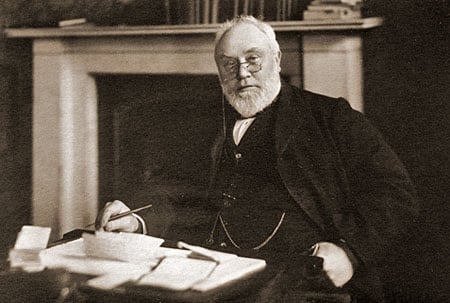The event described in the image did occur in 1851, orchestrated by Colonel Gordon of Cluny. “The Colonel called all of his tenant farmers to a meeting to ‘discuss rents’ and threatened them with a fine if they did not attend. In the meeting hall over 1500 tenants were overpowered, bound, and immediately loaded onto ships for America (specifically Canada). An eyewitness reported: “…people were seized and dragged on board. Men who resisted were felled with truncheons and handcuffed; those who escaped, including some who swam ashore from the ship, were chased by the police….
“On the death of his father in 1814, Gordon had inherited his estates including Cluny Castle in Aberdeenshire – he was already a wealthy man as he also succeeded to his uncle’s estate, who had been a merchant in West India. He was considered to be a “model landlord” to tenants on his Aberdeenshire properties. He was also described as a hard-headed businessman and a miser so tight he moaned he couldn’t afford to get out of bed. He bought the islands of North and South Uist, Barra and Benbecula from the 18th chief of Clanranald, Reginald George Macdonald, in 1838. The clan chief, an Eton and Cambridge-educated man who had been banned by his family’s trust from visiting his Scottish property, was forced to sell due to mounting personal debt. The deal with Gordon signaled the beginning of an even darker, dismal chapter in the livelihood of the tenants. Within nine years, the deteriorating condition of the islanders was described “as a scene of wretchedness” by Reverend Norman Macleod as land for farming was reduced for sheep grazing. “Despicable, nay heart rending,” is how the minister described the scene entering the Cluny estate.

Gordon, by now labelled as ‘the most hated man in Scotland, who also served as a Tory MP for Weymouth and Melcombe Regis in Dorset, England, died in 1858 his estate ultimately passing to the wife of his late son, John Gordon of Cluny. Lady Emily Gordon Cathcart. who visited the estate once in 54 years, continued to “encourage” tenants to leave for Canada and stopped releasing land for farming. Some believe her support for emigration was to clear Catholic tenants from her property. Others say it was to boost the value of her stock in Hudson’s Bay Company and the Canadian Pacific Railway. After her death in 1932, the Estate was managed by her trustees before being sold in 1944 to the London banker, Herman Anton Andreae, before it was taken over by a syndicate of sporting enthusiasts in 1960 with the South Uist Estates Ltd created. In 2006, a community buy-out acquired the entire share capital of the company with Storas Uibis formed by residents. It now manages 93,000 acres of land with a population of 3,000, including 850 tenant crofters.
Please note – this next paragraph is just me discussing some tangents I have seen that have been related to this incident. The most important part of this paragraph starts with “Frankly, I don’t know…”!! Also, thanks to Jack for pointing out how my comments might be misinterpreted!
I have seen this awful event of 1851 described as “The British state has a long history of ethnically cleansing people’s across the globe who are perceived to be a threat, more often than not simply because they indigenously occupy land and resources which the British Invader has sought to claim as it’s own” BUT in this example, this was perpetuated by a Scot on fellow Scots – however I have seen it argued that Cluny was “more English than Scots” given his long association with the British Army and the fact he based himself in Dorset. An argument often made is that as part of the agenda of colonisation education becomes an important way in which attitudes of colonised people are brought “into line” with those of the colonising power – education in India and Africa are some examples of this; and I read recently of a boarding school for Native American young people in the United States that specifically aimed to make them ashamed of their culture and language. In Scottish history, the drawing of the upper echelons of society into the Court in London and into the economic practices of the “more developed” south, particularly after the Act of Union, also led to many of the changes that ultimately saw such horrific treatment and dispossession. Frankly, I don’t know what the answer is, but we should all be aware that very broad statements (as sound as they MAY be) being applied to specific events needs to be very carefully considered.
Gàidhlig for Sassenachs
It is perhaps no coincidence that Gordon also received generous remuneration for his Caribbean plantations when slavery was abolished just like the ancestors of the present incumbent Richard Drax.
Dorset doesn’t half pick them.
PLEASE SUPPORT US FOR JUST £2 A MONTH





